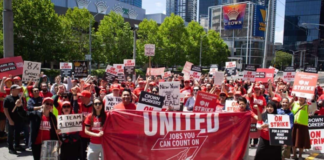University staff continue to pay the price of the cuts to higher education imposed by Labor in April and happily supported by the Liberals. Federal funding to universities will fall by 2 per cent in 2014 and 1.25 in 2015, with a total loss to the sector of $900 million.
The result has been what the national secretary of the National Tertiary Education Union, Grahame McCulloch, describes as “a chilling effect on negotiations”.
The NTEU has reached agreements in the current national round of enterprise bargaining at just seven universities: Curtin, Central Queensland, Edith Cowan, Deakin, Sydney, James Cook and ANU.
At the first three—reached before Labor’s cuts—the pay deal was 4 per cent a year. The other branches have been forced to settle around 3 per cent, which has become the new going rate for the sector.
The NTEU has also lost a staff ballot at Charles Sturt.
Managements at other universities have taken the opportunity to go on the front foot.
At RMIT, in Melbourne, negotiations have dragged on for 15 months, despite a full-day strike, bans on transmitting exam results and shorter stoppages, including a half-day strike on 11 November.
The industrial action has brought RMIT’s pay offer up to 3 per cent, but management is refusing to meet the union’s key claims around a cap on teaching hours and the creation of fellowships (fixed-term roles) for casual academics.
It is also refusing to acknowledge access to rostered days off in the agreement, in a move that members interpret as meaning existing RDO arrangements would be eradicated sooner rather than later.
In an attempt to break the deadlock, the RMIT NTEU membership imposed bans on reporting exam results in Singapore, where RMIT has 7000 students. RMIT responded to this globalisation of the struggle by sending the marking of Singapore exams to academics at RMIT Vietnam, where unions are banned.
This undermines the Melbourne-based academics who fly to Singapore to teach and who therefore mark the exams.
Three NTEU members stood their ground heroically and refused to hand over the guides to exam marking that staff in Vietnam would need.
But the university took the union to Fair Work Australia and won a three-month suspension of the bans.
The situation is at stalemate. Management cannot go for a staff ballot as the RMIT has one of the highest union densities in the sector. But the NTEU’s action to date has not shifted things far enough in members’ favour.
Members are drawing the conclusion that strike action will need to be stepped up. As Solidarity goes to press, they are gearing up to strike again for 24 hours, with the threat of a further strike on graduation day, 18 December.
By an NTEU member





